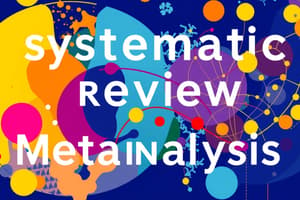Podcast
Questions and Answers
Which of the following statements about the presented observations is true?
Which of the following statements about the presented observations is true?
- They have high internal and external validity.
- They can infer causality.
- They are based on clinical observations. (correct)
- They are based on empirical research findings.
What can be inferred about the validity of the observations?
What can be inferred about the validity of the observations?
- Both internal and external validity are high.
- Internal and external validity are extremely low. (correct)
- Internal validity is high, but external validity is low.
- Internal validity is low, but external validity is high.
What is a challenge in using levels of evidence?
What is a challenge in using levels of evidence?
- Levels of evidence never change over time.
- There is only one organization that provides levels of evidence.
- There is no gold standard rule for levels of evidence. (correct)
- Different organizations have the same levels of evidence.
Which organization's levels of evidence are mentioned in the text?
Which organization's levels of evidence are mentioned in the text?
What is the relationship between quality of evidence and strength of recommendation?
What is the relationship between quality of evidence and strength of recommendation?
What can influence the quality of recommendation?
What can influence the quality of recommendation?
What is an example of a scenario where weak recommendations are made despite high-quality evidence?
What is an example of a scenario where weak recommendations are made despite high-quality evidence?
What is true about the levels of evidence provided by different organizations?
What is true about the levels of evidence provided by different organizations?
Why is it challenging to determine the strength of recommendation?
Why is it challenging to determine the strength of recommendation?
What is the relationship between the quality of evidence and the quality of recommendation?
What is the relationship between the quality of evidence and the quality of recommendation?
Flashcards
Meta-analysis
Meta-analysis
A statistical technique that combines the results of multiple studies to estimate an overall effect size.
Cochrane Collaboration
Cochrane Collaboration
An international organization dedicated to producing high-quality systematic reviews and meta-analyses of healthcare interventions.
Publication Bias
Publication Bias
A phenomenon that occurs when statistically significant results are more likely to be published than non-significant results. This can lead to biased estimates in systematic reviews because unpublished studies are not included.
Levels of Evidence
Levels of Evidence
Signup and view all the flashcards
Level 1a Evidence
Level 1a Evidence
Signup and view all the flashcards
Level 1b Evidence
Level 1b Evidence
Signup and view all the flashcards
Level 1c Evidence
Level 1c Evidence
Signup and view all the flashcards
Level 2a Evidence
Level 2a Evidence
Signup and view all the flashcards
Level 2b Evidence
Level 2b Evidence
Signup and view all the flashcards
Level 3a Evidence
Level 3a Evidence
Signup and view all the flashcards
Study Notes
Meta-Analysis
- A component of a systematic review that involves pooling together the results to get an overall/pooled measure of the association/estimate (e.g. pooled odds ratio)
- Increases statistical power and generalizability of the results
- Quantifies the magnitude and direction of effects across studies, providing a more precise estimate of the overall effect size
Cochrane Collaboration
- An independent, international organization dedicated to promoting evidence-based healthcare by producing high-quality systematic reviews and meta-analyses of healthcare interventions
- Website: http://www.cochrane.org
Why Conduct a Meta-Analysis?
- Increases statistical power: combines data from multiple studies, increasing sample size and precision
- Increases generalizability: combines data from diverse populations and settings, increasing the applicability of the results
- Quantifies the magnitude of effects: provides a more precise estimate of the overall effect size
Publication Bias
- Systematic reviews only reflect on published results
- Statistically significant results are more likely to be published, leading to biased high estimates
- Should be evaluated when conducting a systematic review
Levels of Evidence
- Based on the Oxford Centre for Evidence Based Medicine (2009)
- Levels of evidence are categorized from 1a to 5, with 1a being the highest level of evidence
Levels of Evidence (continued)
- Level 1a: Systematic reviews/meta-analyses of randomized controlled trials
- Level 1b: High-quality individual randomized controlled trials
- Level 1c: High-quality individual non-randomized/non-controlled trials
- Level 2a: Systematic reviews/meta-analyses of cohort studies
- Level 2b: High-quality individual cohort studies
- Level 3a: Systematic reviews/meta-analyses of case-control studies
- Level 3b: High-quality individual case-control studies
- Level 4: Case series, cross-sectional studies, and low-quality cohort and case-control studies
- Level 5: Individual expert opinion/report, expert committee opinion/report, and clinical experiences of respected authorities
Studying That Suits You
Use AI to generate personalized quizzes and flashcards to suit your learning preferences.
Description
This quiz covers the concepts of systematic reviews and meta-analysis, including the formation of Cochrane Collaboration, pooling results, and ruling out chance findings. It also touches on the limitations of conducting meta-analysis and the importance of statistical components. Test your knowledge of these research methods!




